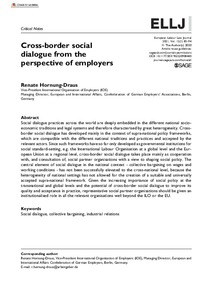Cross-border social dialogue from the perspective of employers

2021
12
1
March
83-94
social dialogue ; collective bargaining ; labour relations ; social partners ; EU policy ; global agreement
Labour relations
https://doi.org/10.1177/2031952520908440
English
Bibliogr.
"Social dialogue practices across the world are deeply embedded in the different national socio-economic traditions and legal systems and therefore characterised by great heterogeneity. Cross-border social dialogue has developed mainly in the context of supra-national policy frameworks, which are compatible with the different national traditions and practices and accepted by the relevant actors. Since such frameworks have so far only developed as governmental institutions for social standard-setting, e.g. the International Labour Organisation at a global level and the European Union at a regional level, cross-border social dialogue takes place mainly as cooperation with, and consultation of, social partner organisations with a view to shaping social policy. The central element of social dialogue in the national context - collective bargaining on wages and working conditions - has not been successfully elevated to the cross-national level, because the heterogeneity of national settings has not allowed for the creation of a suitable and universally accepted supra-national framework. Given the increasing importance of social policy at the transnational and global levels and the potential of cross-border social dialogue to improve its quality and acceptance in practice, representative social partner organisations should be given an institutionalised role in all the relevant organisations well beyond the ILO or the EU."
Digital
The ETUI is co-funded by the European Union. Views and opinions expressed are however those of the author(s) only and do not necessarily reflect those of the European Union or the ETUI.